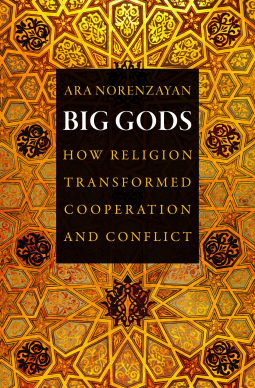
Big Gods
How Religion Transformed Cooperation and Conflict
by Ara Norenzayan
This title was previously available on NetGalley and is now archived.
Send NetGalley books directly to your Kindle or Kindle app
1
To read on a Kindle or Kindle app, please add kindle@netgalley.com as an approved email address to receive files in your Amazon account. Click here for step-by-step instructions.
2
Also find your Kindle email address within your Amazon account, and enter it here.
Pub Date Sep 04 2013 | Archive Date Sep 10 2013
Description
How did human societies scale up from small, tight-knit groups of hunter-gatherers to the large, anonymous, cooperative societies of today--even though anonymity is the enemy of cooperation? How did organized religions with "Big Gods"--the great monotheistic and polytheistic faiths--spread to colonize most minds in the world? In Big Gods, Ara Norenzayan makes the surprising and provocative argument that these fundamental puzzles about the origins of civilization are one and the same, and answer each other.
Once human minds could conceive of supernatural beings, Norenzayan argues, the stage was set for rapid cultural and historical changes that eventually led to large societies with Big Gods--powerful, omniscient, interventionist deities concerned with regulating the moral behavior of humans. How? As the saying goes, "watched people are nice people." It follows that people play nice when they think Big Gods are watching them, even when no one else is. Yet at the same time that sincere faith in Big Gods unleashed unprecedented cooperation within ever-expanding groups, it also introduced a new source of potential conflict between competing groups.
In some parts of the world, such as northern Europe, secular institutions have precipitated religion's decline by usurping its community-building functions. These societies with atheist majorities--some of the most cooperative, peaceful, and prosperous in the world--climbed religion's ladder, and then kicked it away. So while Big Gods answers fundamental questions about the origins and spread of world religions, it also helps us understand another, more recent social transition--the rise of cooperative societies without belief in gods.
Ara Norenzayan is professor of psychology at the University of British Columbia. His work has been featured on CNN and in theNew York Times Magazine, the Economist, Der Spiegel, the Boston Globe, the Toronto Star, Scientific American, and New Scientist. He grew up in Beirut and lives in Vancouver.
Advance Praise
"In a time of heated debate about the origin and function of religion, Ara Norenzayan provides a much-needed, well-written argument based on extensive research. The data reveal how religion impacts human behavior. His view that an omniscient God is our own creation designed to deal with the problem of freeriders deserves much more attention. It brings faith closer to where Darwin thought it belonged, in the sphere of social life and cooperation."--Frans de Waal, author of The Bonobo and the Atheist
"This is a terrific book. Authoritative, clear, and written in a straightforward, entertaining style, it deals with a problem of great interest to a wide range of general readers and academics, including psychologists, anthropologists, historians, and sociologists."--Robert Boyd, coauthor of Not by Genes Alone: How Culture Transformed Human Evolution
Available Editions
| EDITION | Hardcover |
| ISBN | 9780691151212 |
| PRICE | $29.95 (USD) |



